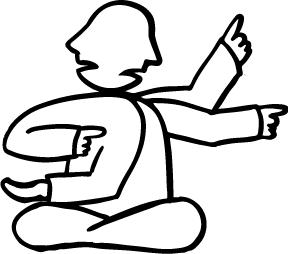ECONOMY 03 – DO NOT COVET
Deuteronomy 5:21
“Do not covet your neighbor’s wife, house, field, slave, ox, donkey, thing.”
- Examples from an agricultural society … ox = plowing, donkey = transport
- Modern day examples: mobile, gadgets, laptop … nari, gari, bari, sari
Coveting versus Desiring
- What does ‘coveting’ mean? Is there no positive side to desiring?
- Yes, if we see an exemplary person, we should be encouraged to imitate them.
- To not covet is a command to creativity, effort and initiative. Desire is good, if I am willing to spend effort, work, time to obtain it. “If he was able to learn this…”
- But typically coveting is when I am just envying, I’m not learning from that person nor am I wiling to do as he did.
A Mental Sin
- Why is this among the 10 commandments? What is so harmful about coveting?
- Coveting doesn’t harm anybody… it’s just in my mind …who will ever know, right?
- Wrong. God calls this sin. It is possible to sin in my mind. Even if nobody knows.
- And it will not stay there. It will lead to sinful action as well.

How is coveting destructive?
- Coveting is destructive as first step towards other sins, it opens the door to
- > > > misuse of funds, wrong means of getting money, bribes, stealing
- > > > conflict in relationships, jealousy, adultery
- How does coveting function? Where are my eyes? What do I focus on?
- Endless mind-circles: “if only I were then I would, then I could”
- And an unspoken second circle: “but I don’t … therefore I can’t.”
- Coveting focuses my eyes on
- > who I am not
- > what I don’t have
- > what I therefore can’t do
- It fills my mind with un-realities and impossibilities
- > Discontent, complaining, comparison, envy, jealousy
- > stops intercession … I already think they got too much
- > Resentment, bitterness, feeling victimized, stinginess, selfishness
- > Laziness, irresponsibility, hopelessness, powerlessness, paralysis
- > Coveting will close down my mind
Thankfulness as an antidote to Coveting
- Thankfulness is the opposite of coveting and commanded by God
- What does thankfulness do to my mind? Where are my eyes? My focus?
- Thankfulness focuses my eyes on
- > what I am
- > what I do have, I have received
- > what is therefore possible
- Thankfulness makes me aware of realities, of my possibilities, of my power
- > It opens doors and options for me, it makes me realize my potential
- Thankfulness says: “I may not have much, but I do have …with it I can …”
- Faithfulness says: “I will work with what I do have”
- Often we think God is selfish when he commands us to thanks him. And he surely enjoys heartfelt thankfulness and thankfulness is definitely appropriate.
- But thankfulness is also a discipline that keeps our mental health
- Thankfulness and faithfulness in New Testament language: Mth 25 … Parable of the talents
- Don’t worry about what you don’t have … be faithful with what you do have!
- Remember: Ownership = responsibility and accountability … don’t cry for two much
- Example: slum mothers, slum huts, both poor, for both the tube well is at the same distance. But one house is clean and orderly, the other one is messy.
- Who do you want to be around, a thankful person or a coveting person?
If a coveting person gets what he or she desires
- What happens if a coveting person gets what they are desiring? Now content?
- No, or not for long. > endless demands, nothing is ever good enough.
- German Proverb: “If a desire is fulfilled, it immediately has young”.
- Contentment is a choice, discontentment also … doesn’t depend on circumstance
- In Bangla: “Ami ja chai, ta pai … tarporeo mone hoy: ki jeno nei’.
Demanding and Blaming
- We could say: “You poor Bangladeshi, you get floods and hurricanes (true!), the British exploited you (true!), your country has a lot of corruption (true!), climate change hits you hard (true!).
- How does a Bangladeshi feel at that? Everyone pitying me may be nice, hopefully they will give aid
- But what is the problem? It means taking responsibility from me, everybody is the problem except me. It leads to a demanding or blaming mindset: “If they would”. So: “they are my problem”
- Whether I blame the situation, the government, my father, Satan or God doesn’t matter. It’s all blame. It’s all “out there”. It leads to irresponsibility, passivity, dependency, anger, bitterness, aggression.
- Demanding is a dangerous path, it’s not the way God works.
- God always focuses back on: “but what will YOU do in these circumstances …”
- The moment I take responsibility for myself, development starts


Demanding human rights?
- We teach people to demand their rights, should we? Are human rights biblical?
- Yes and no. Yes: The whole concept of human rights arose from biblical thinking and Christian countries had rights first.
- No: There is no Bible verse: “I claim my right” and “you must grant my right”
- How then? I am commanded to grant your right. And you are commanded to grant my my right. … Not demanding “he should” but responsibility “I should”.
Sequence of pronouns
- In the Greek language (and subsequently in many modern languages the sequence in Conjugation is: I, you, he, …
- In the Hebrew of pronouns in Conjugation is: he, you, I …
- This is a significant sequence!
- It is also reflected in well known passages like: “Love the Lord (He) and your neighbor (you) as yourself (me)
- My priority is first God (he), then my neighbor (you), then myself.